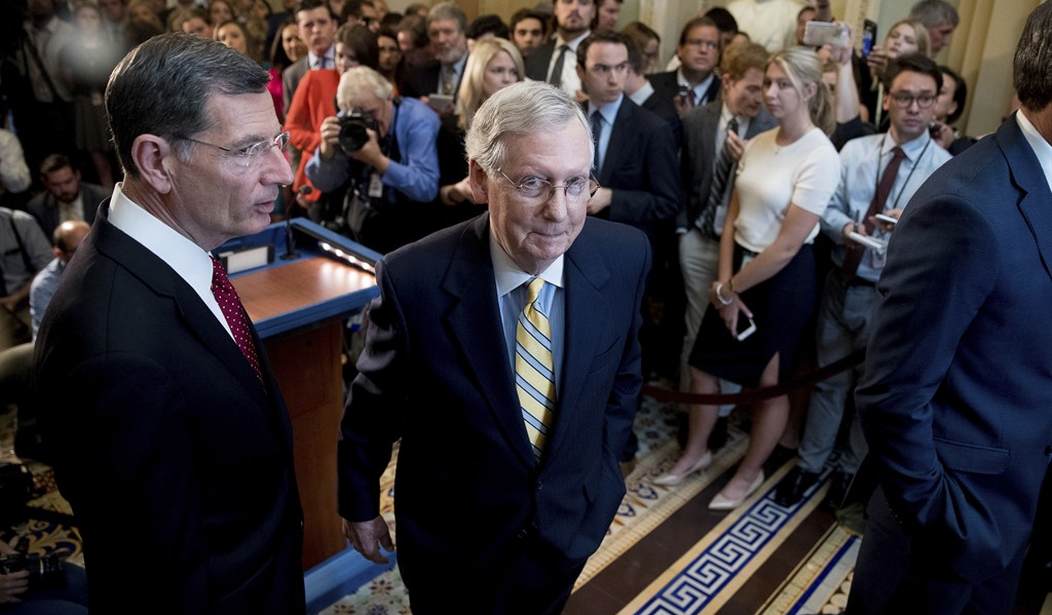State by state, insurers keep bailing out of the ObamaCare exchanges, leaving consumers with no options to satisfy the mandate. Just a few weeks after Anthem announced it would leave 20 counties in Ohio without any access to ACA-compliant individual insurance plans, another Ohio insurer pulled out of the state’s ACA exchanges. Premier’s exit impacts nine Ohio counties, and once again points up the crisis as Congress tries to muddle through to a solution:
A Dayton-based insurer is the latest to leave Ohio’s health care exchange, leaving people in nine Southwest Ohio counties with one fewer option.
The Premier Health Plan said Thursday that uncertainty surrounding the future of the Affordable Care Act, better known as Obamacare, fueled its decision to leave the Ohio exchange as of Jan. 1, 2018. The move affects people in nine counties, including Butler and Warren. …
The move comes weeks after Anthem announced it would withdraw. The decision left residents in 20 counties with no insurer on Ohio’s exchange for 2018.
In a healthy market, the exit of a major player would prompt smaller companies to fill the demand left behind. (Or for that matter, the larger player wouldn’t leave in the first place.” Premier’s decision to rid itself of the ObamaCare business while keeping its employer-based plans in place show that the issue isn’t in the overall health insurance business, but only in the segment that the federal government took over in 2010.
The meltdown is accelerating, so what exactly will Congress do about it? So far, the process is stalled, even with Mitch McConnell doing his best Monty Hall impersonation. Late last night, another $62 billion of the estimated $180 billion or so cushion got allocated to an innovation fund that will allow states to backstop insurers while they set up non-compliant plans that will pull in more enrollees. The program will target low-income Americans who struggle to pay the premiums and deductibles in the compliant plans:
The legislation, as currently drafted, dedicates $62 billion over eight years to encourage low-income people with high healthcare costs to buy insurance, according to a summary posted by the Senate Budget Committee.
A GOP aide said leaders are prepared to “pour a lot of money” into the fund to address concerns from a variety of moderates that the bill’s tax credits are not generous enough to help low-income people buy insurance. ….
It would come on top of $50 billion the legislation includes in its short-term stabilization fund, which is designed to reduce premium costs and give consumers “more choice in insurance markets,” according to the Budget panel summary.
Republican negotiators have concluded that not much more money can be spent through the short-term fund given the limits of the market to absorb it, according to the aide.
This is a sop to the moderates, who worry that the Senate’s BCRA gives away too much to higher-end earners while leaving lower-income Americans without any help at all. Since the money is granted to the states, some moderates aren’t entirely sold on the idea, as they wonder whether the money will go where intended. If that’s the problem, though, then there’s not much point in repealing ObamaCare at all, which is predicated on federal control of the market.
As if that’s not enough of a complication, Donald Trump tweeted out that the GOP should just do a repeal now, and worry about replacing later:
https://twitter.com/realDonaldTrump/status/880737163247267840
Rand Paul loved that idea:
I have spoken to @realDonaldTrump & Senate leadership about this and agree. Let's keep our word to repeal then work on replacing right away.
— Senator Rand Paul (@RandPaul) June 30, 2017
Republicans might have done that from the beginning, except that Trump repeatedly promised not to do it on the campaign trail. He insisted on a repeal-and-replace plan that would ensure that no one lost in the transaction, a position that moderates have held all along as well. However, that appears to be the direction McConnell is now heading:
Colleague John Roberts rpts WH expects Senate to send 2 health care bills to CBO. Could fall back to separate repeal/replace bills
— Chad Pergram (@ChadPergram) June 30, 2017
If that’s the case, though, can both go through reconciliation? The Senate set up the Better Care Reform Act (BCRA) as a reconciliation effort in January, but only as a single bill. If not, then McConnell would have to choose which one will get the 51-vote treatment — and hope that it can get a majority at all, in both the Senate and the House. And it’ far, far, far from clear that moderates will sign onto a repeal without a replacement, which is why we’ve seen Republicans go down the repeal-and-replace rabbit hole since January, even though a flat-out repeal might shake loose some Democrats to work on what follows.








Join the conversation as a VIP Member